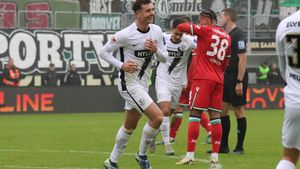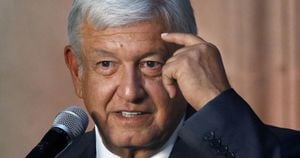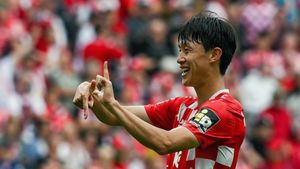Mikheil Kavelashvili, the former Premier League footballer, has officially been elected as the new president of Georgia, marking a significant shift in the country's leadership amid rising tensions over its ties with Russia and intensifying domestic protests. The 53-year-old, who played as a striker for Manchester City during the 1996-1997 season, was elected by the ruling Georgian Dream party's electoral college on December 14, 2024. Notably, he was the sole candidate on the ballot, reflecting the stranglehold his party maintains over Georgian politics, especially following allegations of election fraud during recent parliamentary elections.
The election of Kavelashvili follows weeks of protests sparked by the government's controversial decision to freeze the country’s European Union accession talks. This abrupt halt to Georgia’s long-cherished goals of joining the EU has provoked widespread outrage among the populace, many of whom see integration with Europe as integral to their national identity. Protesters rallied fervently outside the Georgian Parliament on the day of Kavelashvili's election, voicing their displeasure at what they perceive as treachery against their desire to align with the West.
Protests erupted across Tbilisi, with demonstrators throwing footballs, mocking Kavelashvili’s sporting background, and waving their university diplomas as badges of discontent against his perceived lack of educational credentials. Vezi Kokhodze, one of the protesters, described the election as "treason" against Georgian aspirations to connect with the West, emphasizing the systemic push to revert the country to its Soviet roots.
While his election has elevated him to the largely ceremonial position of president, Kavelashvili's election symbolizes the tightening grip of the Georgian Dream party over the country's governance. The party has faced serious accusations of rigging the October parliamentary elections, where they ostensibly secured nearly 54 percent of the vote, bolstered by support from Moscow. The electoral college responsible for Kavelashvili's ascent is composed predominantly of MPs and local government representatives loyal to Georgian Dream, raising skepticism about the democratic integrity of the process.
Since the ruling party decided to delay discussions on EU membership until at least 2028, tensions have surged, with mass protests continuing to erupt nightly. Demonstrators have clashed with police, some of whom have employed tear gas and water cannons to disperse crowds. Activists argue the government's narrative, dismissing protests as attempts at staging violent coups, reflects authoritarian tendencies reminiscent of Russian governance, where public dissent is met with severe crackdowns.
Outgoing president Salome Zourabichvili, known for her pro-Western stance, expressed her intent to remain in office beyond her term's official end, likening Kavelashvili’s election to "a mockery of democracy." She has imbued herself with the symbolic role of leading the opposition to the ruling party's actions, urging international observers to recognize her as the legitimate president—an assertion echoed by other opposition members who have boycotted parliamentary sessions.
Addressing the national sentiment, Zourabichvili commented on social media, emphasizing the humor and irony of seeing a former footballer become president at such a tumultuous time. She reminded the populace of their aspirations for alignment with European values, challenging Kavelashvili's intentions and those of the ruling party.
Kavelashvili's political career had its origins post-football when he was elected to parliament for Georgian Dream back in 2016. He became known for his anti-Western rhetoric and the controversial legislation he co-authored, requiring organizations receiving more than 20 percent of their funding from abroad to register as foreign agents. This move has drawn parallels to laws enacted under Putin's regime aimed at stifling dissent.
Demonstrators—some dressed as football fans—continue to gather, vowing to persist until what they believe is "true democracy" is restored. Protester Kato Kalatozishvili emphasized their collective resilience against any government inclination toward Russian integration, asserting, "If they want to go to Russia, they can, but we are staying here. We are fighting for our European identity!"
Internationally, the response to Kavelashvili's election has been met with concern. Western governments have already observed Georgia's recent pivot toward Russia, especially amid geopolitical tensions stemming from the war in Ukraine. The EU’s delayed support and calls for reforms remain dire, and as protests rage, the power dynamics within Georgian politics face scrutiny from both the public and global observers.
Georgia, once touted as one of the most pro-Western and democratic nations of the post-Soviet space, is now grappling with the reality of its shifting political winds. Critics of Kavelashvili and Georgian Dream contend the country is steering away from European integration and democratic ideals, undermining years of progress. Caught between competing influences, the future of Georgia's political identity hangs precariously in the balance.
The path forward remains uncertain, with Kavelashvili's presidency marking the beginning of what many anticipate to be fraught with challenges—both from relentless civil unrest and the enduring need to navigate external pressures from Russia and the West. The chants echoing through the streets of Tbilisi, calling for change, promise to linger amid the cold Georgian winter, reflecting the deep-seated yearning for autonomy and democratic integrity among its people.



